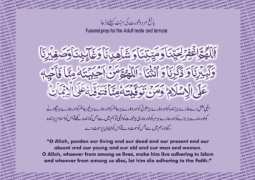
Offering one’s condolences to someone means sharing in his grief and encouraging him to be patient. It means enjoining patience to comfort the distressed person and to lighten his or her grief and misfortune.
Their Legality, Condolences
Condolences are desirable, even if the deceased was a non-Muslim. Ibn Majah and Al-Baihaqi reported from ‘Amr ibn Hazm that the Prophet, peace be upon him, said: “Every believer who consoles his brother in distress, will be dressed by Allah in an apparel of honor on the Day of Resurrection.” It is recommended, however, that the condolences be offered only once. The condolences should be offered to the entire family of the deceased, that is, to all the relatives, old and young, men and women. (The scholars exclude from this list beautiful young women. Only their mahram relatives may offer condolences to them) One may offer condolences either before or after the burial up to three days after death. If the person either offering or receiving condolences was not present at the time of death, condolences may be offered even at a later period.
The Wording of Condolence
Condolences may be offered in any words so long as they lighten the distress, induce patience, and bring solace to the bereaved. It is preferable, however, to use the wording as transmitted in hadith. Usamah ibn Zaid reported, “A daughter of the Prophet, peace be upon him, sent him a message to come to her house, because a son of hers had died. In response he sent her a message with his regards saying: ‘Verily, to Allah belongs what He has taken, and to Him belongs what He has given. For everything He has set a term. So be patient and be content’.’’ (Bukhari. In Comment An-Nawawi said: “This is a very comprehensive hadith. It contains a number of essential principles of Islam. It encourages one to be patient in the face of catastrophe and hard times. The meaning of ‘what Allah takes’ is that everything belongs to Allah. Therefore what he takes also belongs to Him and not to others. He takes what He owns. Whatever we have is on trust. Thus, we should be patient and content with whatever befalls us.”)
At-Tabarani, Al-Hakim, and Ibn Mardawayh reported - with a chain that has an unreliable narrator - from Mu’azh ibn Jabal that when a son of his slied, Mu’azh received a letter from the Prophet, peace be upon him, offering him condolences. The Prophet wrote to him: “In the name of Allah, the most Beneficent and the Most Merciful. From Muhammad, the Messenger of Allah, to Mu’azh bin Jabal. Peace be upon you. I praise Allah, there is no god but He. May Allah increase your reward, grant you patience, and give us and you the power to offer our thanks, for verily, our lives, our wealth, and our families are gifts of Allah entrusted to us only for a while. May Allah grant you joy and bless you with a large reward, mercy and guidance. If you are content with Him, you should be patient. Do not let your grief destroy your reward, so that you may regret it later on. Remember grieving over the deceased will not restore him to life, nor remove grief. Whatever is destined to happen, it is as if it has already occurred. Peace be on you’.’’ (This hadith is weak. Mu’azh’s son reportedly died two years after the death of the Prophet, peace be upon him).
Ash-Shafi’i has reported the following in his Musnad from Ja’far ibn Muhammad, who reported from his father and from his grandfather, both of whom said: “When the Prophet, peace be upon him, died and condolences were offered, they heard someone saying. ‘In Allah is the best consolation against every catastrophe, a substitute for every loss, and a replacement for anything that is missed. Trust Allah, seek His aid, and be hopeful of His mercy. The one really afflicted is the one who is deprived of the reward for his misfortune.” The chain of narrators of this hadith is weak. Muslim scholars say that if a Muslim offers condolences to another Muslim he should say: “May Allah increase your reward, give you the best consolation, and forgive your deceased beloved.” And if one gives condolences to a Muslim for a disbelieving relative, one should say: “May Allah increase your reward, and grant you the best of consolation.” If one gives condolences to a disbeliever for a Muslim relative, one should say: “May Allah give you the best of condolences and grant forgiveness to your deceased beloved.” If both the deceased and the one to whom condolences are given are disbelievers, then one should say: “May Allah grant you a substitute.” As for the response to condolences, the receiver should respond, “Amin” and “May Allah reward you.” According to Ahmad, one may or may not shake hands with the bereaved when offering condolences. If one sees a person who has torn his or her clothes because of a misfortune, one should comfort the person, and should not refuse to do what is good because of his or her vain act, but it is good if one bids such a person to refrain from doing so.
Sitting for Condolences
The Sunnah concerning this is that one should offer condolences to the bereaved family and leave. Neither the consoler nor the consoled should sit down. This is the lesson we learn from the example of our righteous predecessors. Ash-Shafi’i in his Al-Umm said, “I dislike gathering in groups together to give condolences even if those gathered do not cry. Such a gathering revives sorrow and adds to the grief and burden of the bereaved family. An-Nawawi said, “Ash-Shafi’i and his companions disliked sitting for condolences, whereby members of the family stay in their homes to receive anyone coming to give their condolences. Instead, they should go about their usual tasks and needs. This applies both to men and women. Al-Muhamili states this explicitly and transmits it in reference to a text from Ash-Shafi’i. This is Makruh Tanzihi (Makruh tanzihl signifies something which is undesirable yet is closer to the lawful) unless it is coupled with some other innovation. If it is accompanied with another forbidden innovation (Bid’ah), as is generally the case, then it is regarded as one of the strongly forbidden acts. All such acts are an innovation, and as a sound hadith says, “All novel acts are an innovation and every innovation is error.
“Ahmad and many other Hanafi scholars also hold this opinion. Early Hanafi scholars, however, held the view that there is nothing wrong in holding a gathering at places other than mosques for three days of condolence, so long as one does nothing prohibited. The practices of some people nowadays, such as gathering for condolences, setting up tents, spreading carpets, and incurring a lot of expenses out of arrogance and show off are all despicable innovations that are forbidden and must be avoided, especially when most of these acts are contradictory to the teachings of the Qur’an and sunnah and are vestiges of pre-Islamic customs of Jahiliyyah. Some of these innovations are reciting the Qur’an in a melodic fashion and disregarding the rules of proper recitation, or not keeping silent when listening to the Qur’ an or indulging in smoking or such other activities. And this is not all. Some of these slaves of their desires indulge in extreme innovation. They are not satisfied with the days originally prescribed by Islam, but designate Wednesday as the day to renew these abominations and to indulge in these innovations. They celebrate the anniversary of death on the first day and observe remembrance on the second day, and do other such other things without any justification by either text or reason.
To be continued




